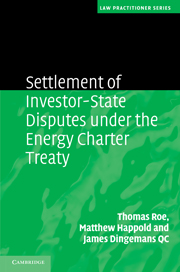Book contents
- Frontmatter
- Contents
- Foreword
- Preface
- Table of cases
- 1 Introduction
- 2 The applicable law
- 3 Availability of dispute settlement under Article 26
- 4 European Union law and the Energy Charter Treaty
- 5 Substantive law
- 6 Procedure
- 7 Contracting Parties' international responsibility for breaches of Part III of the ECT
- 8 Taxation
- Appendix A Selected provisions of the Energy Charter Treaty
- Appendix B Signatories to the Energy Charter Treaty
- Bibliography
- Index
Foreword
Published online by Cambridge University Press: 05 July 2011
- Frontmatter
- Contents
- Foreword
- Preface
- Table of cases
- 1 Introduction
- 2 The applicable law
- 3 Availability of dispute settlement under Article 26
- 4 European Union law and the Energy Charter Treaty
- 5 Substantive law
- 6 Procedure
- 7 Contracting Parties' international responsibility for breaches of Part III of the ECT
- 8 Taxation
- Appendix A Selected provisions of the Energy Charter Treaty
- Appendix B Signatories to the Energy Charter Treaty
- Bibliography
- Index
Summary
Of The Pilgrim's Progress, Huckleberry Finn said that he ‘read considerable in it now and then’, and that ‘the statements was interesting, but tough’. To the quite small body of persons who have ‘read in’ them, the documents constituting the Energy Charter Treaty may or may not have been interesting, but they will surely have found them tough. In contrast with the ICSID Convention, which as a text is a masterpiece of multinational drafting even though as a practical source of rules it lacks spine, the Energy Charter Treaty is an uncouth thicket from which even an interested person could well recoil. Nevertheless, although the field of view is narrow and highly particular, it is important in theory as well as in practice, and calls for an informed, readable and scholarly monograph. This is what the present work supplies.
Since this is a foreword, not a review, I must with difficulty abstain from offering a personal appraisal of international energy law and practice; of dispute resolution in that field; and of the crippling inconsistencies in the jurisprudence of bilateral investment treaty disputes, now apparently incurable. The books get longer and longer, and so do the awards, whilst colloquia, study groups, task forces and the like continue to proliferate, often producing book-length records of their proceedings; yet in the absence of a doctrine of binding precedent there is currently no means of imposing order where it is needed.
- Type
- Chapter
- Information
- Settlement of Investment Disputes under the Energy Charter Treaty , pp. xiii - xivPublisher: Cambridge University PressPrint publication year: 2011



